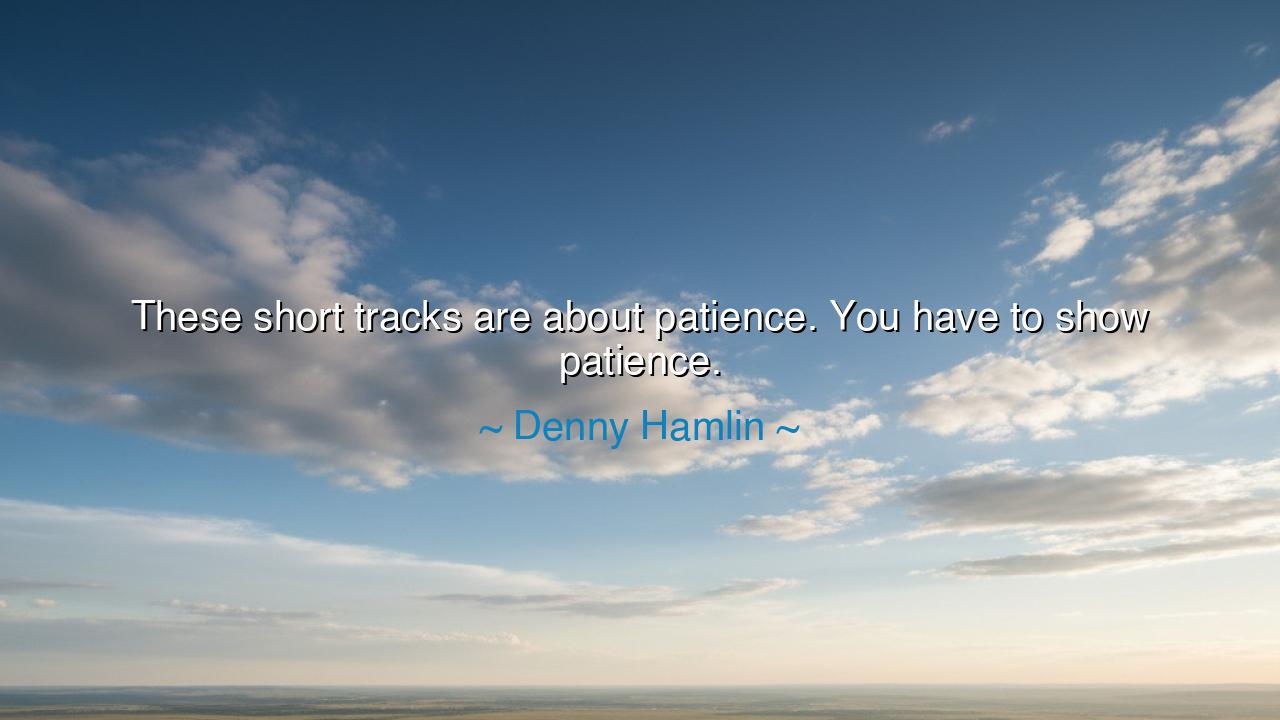
These short tracks are about patience. You have to show






Hear the words of Denny Hamlin, forged in the fire of speed and pressure: “These short tracks are about patience. You have to show patience.” At first, the words may seem to belong only to the racing world, to the oval circuits where engines roar and tires scream. Yet within them is a truth far older than motorsport, a wisdom that reaches into the heart of life itself: that in the fiercest contests, where the space is narrow and the margin for error thin, it is not always boldness that brings victory, but the steady hand, the calm spirit, the will to endure.
When Hamlin speaks of short tracks, he refers to those tight circuits of racing where chaos is constant. On such tracks, the temptation is to force every opening, to push past every rival, to let impatience drive the wheel. But those who cannot restrain themselves are soon undone—wrecked, overtaken, or left behind. Here the lesson is plain: to survive in close quarters, to prevail where others falter, one must embrace patience. For the victory belongs not to the one who burns most furiously, but to the one who endures most wisely.
This wisdom is not confined to the racetrack. History offers us countless mirrors. Consider the tale of George Washington during the American Revolution. Though pressed by a mighty empire, he often chose retreat and delay rather than rash battle. Many accused him of timidity, yet it was his patience, his willingness to wait for the right moment, that preserved his army and eventually delivered victory. Just as on the short track, where a single reckless move can destroy the race, so too in war, the wise leader knows that restraint may be the key to triumph.
So too in the world of discovery. The great scientist Charles Darwin did not publish his theory of evolution upon its first spark. He waited, studied, refined—decades of patience shaped his work into a foundation that could withstand the storms of criticism. Had he rushed, his ideas might have collapsed under the weight of incompleteness. In this, Darwin lived out the same truth Hamlin names: in places where pressure is greatest, where every choice matters, it is patience that secures lasting achievement.
Hamlin’s words also strike against the illusions of our own age, an age that worships speed and immediate results. We are taught to seize every moment, to demand instant reward, to fear waiting as weakness. Yet in the crucible of life—as on the short track—impatience often leads to ruin. Relationships fail when rushed, work crumbles when forced, dreams collapse when chased without discipline. It is the patient soul who endures, who weathers storms, who finds the opening at the right time and seizes it with steady strength.
The lesson is clear: cultivate patience, especially when the arena is small, the pressure great, and the temptation to hurry overwhelming. Do not be deceived into thinking that constant aggression is the only road to success. True mastery lies in knowing when to act, when to wait, and when to endure. On the racetrack, this wins championships. In life, it builds legacies.
Practically, this means restraining the impulse to force outcomes. When faced with difficulty, breathe, endure, and trust the rhythm of time. Wait for the right opportunity rather than grasping at every shadow. Learn that sometimes the shortest track requires the longest patience. In business, in love, in personal growth—remember Hamlin’s wisdom: show patience, or you will be undone by haste.
Thus his words, though born of racing, echo as an eternal truth: “These short tracks are about patience. You have to show patience.” Let them remind us that the narrow roads of life, the crowded arenas, the tightest struggles—these are not conquered by fury, but by calm endurance. To master them is to master oneself, and in such mastery lies true victory.






AAdministratorAdministrator
Welcome, honored guests. Please leave a comment, we will respond soon